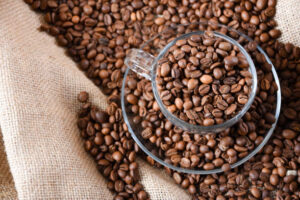For many of us, a day without coffee feels incomplete. This aromatic elixir not only jump-starts our morning but also provides a comforting ritual throughout the day. However, there’s a persistent belief that coffee, particularly decaf, can cause dehydration, which raises questions about our daily beverage choices. In the realm of health, hydration is foundational. It’s a topic as essential as it is muddled with myths, and understanding its interplay with our favorite beverages is crucial. This comprehensive post aims to demystify the relationship between decaf coffee and hydration, providing clarity for health enthusiasts, coffee lovers, and the fitness community.

Table of contents
Understanding Decaf Coffee
First things first, what is decaf coffee? Decaf, short for decaffeinated, is a form of coffee that has most of its caffeine removed. This is achieved through several methods including the Swiss water process, the direct method, and the carbon dioxide process, each offering a slightly different decaffeination experience. Decaf coffee still retains a small amount of caffeine, generally around 2 to 4 mg per 8-ounce cup, in comparison to roughly 95 mg in a regular cup of joe. This means that decaf coffee provides the same flavor and aroma as regular coffee but with significantly less caffeine.
Debunking the Myth
One of the most common misconceptions about decaf coffee is that it can cause dehydration. This belief stems from a study conducted in 1928, which found that caffeine caused an increase in urine output. However, more recent studies have shown that caffeine does not cause dehydration and has a similar hydrating effect as water. Furthermore, decaf coffee contains even less caffeine than regular coffee, making it unlikely to have any significant impact on hydration levels.
The Importance of Hydration
To understand the relationship between decaf coffee and hydration, it’s essential to first grasp the importance of hydration for our overall health. Our bodies are made up of about 60% water, and staying hydrated is necessary for optimal bodily functions. Water helps regulate body temperature, carry nutrients to cells, cushion joints, and flush out waste products. Dehydration can lead to a host of health issues such as fatigue, dizziness, headaches, and even kidney problems.
The Hydrating Properties of Decaf Coffee
While it’s clear that hydration is essential, many people might wonder if choosing decaf coffee over regular coffee can affect their hydration levels. The truth is that decaf coffee contains mostly water and has a similar hydrating effect as regular coffee. In fact, studies have shown that caffeinated beverages, including decaf coffee, contribute to our daily fluid intake and are not dehydrating. However, it’s worth noting that excessive consumption of caffeine can have a diuretic effect and may cause some individuals to experience increased urination.
Finding a Balance
So, what does all this mean for our daily beverage choices? In short, decaf coffee is not dehydrating and can contribute to our overall fluid intake just like regular coffee or other beverages like water, tea, and juice. However, it’s essential to find a balance and not rely solely on caffeinated or decaf coffee for hydration. The best approach is to listen to our bodies and make sure we’re drinking enough fluids throughout the day.
Dehydration Myths and Facts
The idea that decaf coffee could dehydrate you is a common misconception based on the diuretic property of caffeine. A diuretic is a substance that promotes the production of urine, which can theoretically lead to dehydration if not balanced by sufficient fluid intake. However, caffeine’s diuretic effect is mild, and the water content in decaf coffee largely offsets this concern.
Scientific Insights on Hydration Effects
Numerous studies have examined the hydration effect of caffeinated beverages, and the consensus is that they contribute to daily fluid intake without significantly increasing excreted urine volume. One study in the Journal of the International Society of Sports Nutrition found that caffeinated beverages can maintain hydration to the same extent as water.
Hydration Tips for Coffee Lovers
For aficionados who wish to enjoy their coffee without compromising hydration, here are some useful strategies:
- Regular sips of water: Alternating between sips of water and coffee can help maintain hydration levels.
- Think quality: Choose decaf coffee with high water content. French press and percolator methods, for instance, can retain more water in the brew.
- Incorporate water-rich foods: Foods high in water, like fruits and vegetables, can also contribute to your hydration goals.
Impact on Health and Fitness
The relationship between coffee, particularly its decaffeinated form, and health is multifaceted. While moderate coffee consumption is generally regarded as safe and can even offer health benefits such as antioxidant properties, its impact on hydration becomes more critical in specific contexts. For instance, athletes or individuals with high fluid output may need to pay more attention to their hydration levels and choose beverages that contribute to it.
Coffee During Workouts
For those who enjoy a cup of decaf before a workout, the hydration question arises. During exercise, the body’s fluid needs increase, and it’s vital to replenish fluids lost through sweat. While caffeine can enhance performance, it’s important to consider overall fluid intake, as excessive caffeine consumption can lead to unwanted side effects. It’s recommended to stay hydrated during workouts by drinking water or sports drinks. And for those who enjoy a pre-workout coffee, choosing decaf can be a beneficial option as it contributes to overall fluid intake without added caffeine. So, go ahead and enjoy your cup of decaf before hitting the gym! Thus, debunking any myths about the relationship between decaf coffee and hydration. Keep in mind, staying hydrated is essential for our overall health, and decaf coffee can be a delicious and hydrating option for any coffee lover. Just remember to listen to your body, stay balanced, and enjoy your favorite beverages in moderation.

Balancing Act
The key to enjoying decaf coffee without concerns over dehydration is balance. Considering the fluid goals of 8-10 cups of water per day, decaf coffee can be part of a healthy hydration routine. It’s also essential to assess individual tolerance to caffeine and adjust consumption accordingly. As with any dietary choice, moderation is key. When it comes to hydration and decaf coffee, finding a balance that works for you is the best approach.
Conclusion
In the world of beverages, decaf coffee stands as a nuanced companion to our quest for hydration and health. By untangling the myth that decaf coffee leads to dehydration, we empower ourselves to make more informed choices about what we drink and how it affects our bodies. The next time you savor a cup of decaf, rest assured that you’re likely quenching your thirst, one delicious sip at a time. Be mindful of your fluid intake, enjoy coffee as part of a balanced diet and hydration plan, and continue to explore the rich and complex world of our favorite brews with clarity and confidence.






